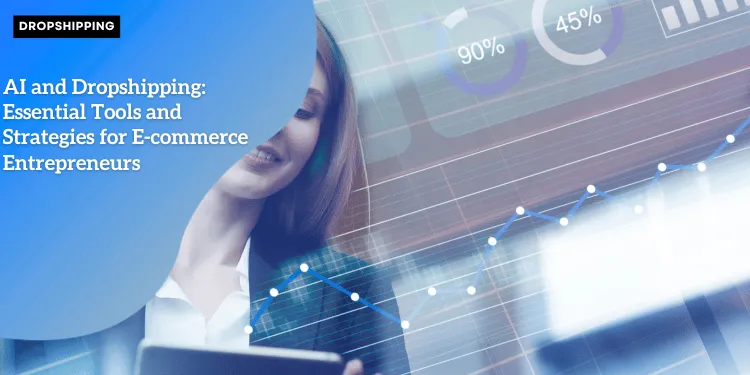AI and Dropshipping: Essential Tools and Strategies for E-commerce Entrepreneurs

Anúncios
The Transformative Impact of AI on E-commerce and Dropshipping
Artificial intelligence (AI) is revolutionizing many industries, but its impact on e-commerce and dropshipping is truly transformative.
AI has streamlined various facets of the e-commerce process, making it more efficient and profitable.
From predicting customer preferences to optimizing supply chains, AI-driven tools are reshaping how online businesses operate.
Dropshipping, in particular, benefits immensely from AI by automating tasks that traditionally required significant time and manual effort, thereby boosting overall efficiency and accuracy.
Anúncios

How AI is Democratizing Entrepreneurship in the Digital Age
AI is not just changing how businesses operate but is also democratizing entrepreneurship.
Tools that once required substantial investment and technical know-how are now accessible to anyone willing to venture into e-commerce.
Anúncios
Brian Chesky, CEO of Airbnb, suggests that AI is making it possible for millions of new startups to emerge.
This accessibility means that individuals from various backgrounds can harness the power of AI to launch and scale their businesses.
This level of democratization lowers the entry barriers and allows for more innovation and diversity in the entrepreneurial landscape.
The Potential for New Entrepreneurs to Leverage AI Tools
The potential for new entrepreneurs to leverage AI tools is immense.
AI-powered inventory management systems can automatically track and restock products, ensuring that businesses never run out of essential inventory.
Predictive analytics help in forecasting trends and optimizing stock levels, reducing waste and costs.
For customer engagement, AI chatbots provide 24/7 support, significantly enhancing customer experience and freeing up human resources for more complex tasks.
Personalized product recommendations driven by AI can also increase sales by targeting customers with relevant product suggestions.
AI tools can handle mundane yet crucial tasks such as order fulfillment and supplier communications, allowing entrepreneurs to focus on strategic growth and creative aspects of their business.
This not only improves efficiency but also scales operations rapidly without proportional increases in workload or staff.
As AI continues to evolve, so will its applications in e-commerce and dropshipping.
Entrepreneurs should stay abreast of these advancements, as they provide avenues for scalable growth and competitive advantage.
Embracing AI is not just about keeping up with the trend—it’s about future-proofing your business in an ever-evolving digital marketplace.
With the foundation laid by AI’s transformative effects on e-commerce and dropshipping, the next pivotal area to explore is how AI tools can optimize inventory management, forecast trends, and streamline supplier relationships.
Essential AI Tools for Inventory Management
AI-Powered Systems for Automated Product Tracking and Restocking
AI is revolutionizing inventory management by automating product tracking and restocking.
These smart systems use machine learning algorithms to monitor inventory levels in real-time, ensuring that popular items are never out of stock.
For example, if sales data indicates that a certain product is selling quickly, the AI system can trigger automatic restock orders to suppliers, preventing stockouts and keeping customers satisfied.
This process not only saves time but also significantly reduces human error, allowing e-commerce businesses to operate more efficiently.
Predictive Analytics for Inventory Optimization and Trend Forecasting
Predictive analytics is an essential AI tool that helps e-commerce entrepreneurs optimize their inventory and forecast trends.
By analyzing historical sales data, seasonality, and market trends, AI can predict future demand for various products.
This allows businesses to adjust their inventory levels proactively, minimizing overstock and stockout situations.
For example, if data indicates increased demand for summer clothing in the coming months, the system can advise store owners to stock up on those items in advance.
Such foresight helps in maintaining a balanced inventory, reducing costs, and maximizing profits.
Streamlining Supplier Relationships and Order Fulfillment
AI tools play a crucial role in streamlining supplier relationships and order fulfillment processes.
By automating communication with suppliers, these systems ensure timely restocking and efficient handling of purchase orders.
For instance, AI can identify the best suppliers based on factors such as price, lead time, and reliability, facilitating better decision-making.
Additionally, AI-driven platforms can automate order confirmations, track shipment statuses, and manage warehouse operations, ensuring a seamless supply chain.
This enhanced coordination means that businesses can focus more on strategic initiatives rather than being bogged down by logistical details.
AI-powered tools for inventory management are game-changers for e-commerce and dropshipping businesses.
They not only enhance operational efficiency but also provide deep insights into market trends and customer behavior.
By leveraging these tools, entrepreneurs can maintain optimal inventory levels, reduce costs, and ensure high customer satisfaction—laying the foundation for sustainable and scalable business growth.
AI-Driven Customer Experience Enhancement
Implementation of AI Chatbots for 24/7 Customer Support
One of the greatest strengths of AI in dropshipping is its ability to provide around-the-clock support through AI chatbots.
These smart assistants handle customer inquiries any time of day, reducing the need for human intervention and dramatically improving response times.
Whether a customer has a question about product availability, shipping details, or return policies, an AI chatbot can provide instant and accurate responses.
This ensures customers always feel supported and valued, enhancing overall satisfaction and loyalty to the brand.
Personalized Product Recommendations Based on Customer Behavior
AI excels in analyzing vast amounts of data to understand customer preferences and behaviors.
By tracking the interactions and purchase history of shoppers, AI algorithms can deliver highly personalized product recommendations tailored to each individual.
This not only boosts the likelihood of conversions but also enhances the shopping experience by showcasing products that genuinely interest the customer.
Personalized recommendations increase the average order value and foster a sense of connection between the customer and the brand.
Automated Response Systems for Common Customer Inquiries
Automating responses to common customer inquiries, such as FAQs, frees up significant time for entrepreneurs.
AI-driven systems can quickly address repetitive questions related to order status, payment options, or general product information.
This efficiency allows human customer service representatives to focus on more complex issues that require a personal touch.
By integrating automated response systems, businesses can maintain high levels of customer support without overwhelming their human resources.
The effective use of AI to enhance customer experiences not only streamlines operations but also fosters stronger relationships with customers, setting the stage for sustained success.
Marketing Automation and Personalization
AI Tools for Targeted Advertising and Customer Segmentation
AI has revolutionized the way businesses approach advertising and customer segmentation.
With sophisticated algorithms, AI tools analyze vast amounts of data to identify key customer demographics and behaviors.
This enables e-commerce entrepreneurs to create highly targeted advertising campaigns that reach the right audience at the right time.
By leveraging AI for customer segmentation, businesses can categorize their customers based on various characteristics such as purchasing behavior, preferences, and demographics.
This targeted approach ensures that marketing efforts are more efficient and effective.
Automated Social Media Marketing and Content Creation
Managing social media accounts can be a time-consuming task for any business, but AI simplifies this process significantly.
AI-powered tools can automate social media marketing, from scheduling posts to engaging with customers.
These tools use data analytics to determine the best times to post and the type of content that resonates with specific audiences.
Additionally, AI can assist in content creation by generating engaging social media posts, suggesting relevant hashtags, and even creating customized advertisements.
This not only saves time but also ensures a consistent and impactful online presence.
Data-Driven Pricing Strategies and Optimization
Optimizing pricing strategies is crucial for maximizing profits and staying competitive in the market.
AI tools provide data-driven insights that help businesses set optimal prices for their products.
By analyzing market trends, competitor prices, and customer behaviors, AI can suggest the best pricing strategies to attract and retain customers.
These tools can also dynamically adjust prices in real time based on demand fluctuations, ensuring that businesses remain competitive without sacrificing profitability.
As AI continues to shape the landscape of e-commerce, mastering these AI-driven marketing automation and personalization strategies will be essential for any entrepreneur looking to thrive in the digital age.
Analytics and Performance Optimization
AI-Powered Analytics for Sales Performance Tracking
Effective sales performance tracking is essential for a thriving dropshipping business.
AI-powered analytics tools can effortlessly monitor sales on various platforms, generating comprehensive reports and valuable insights.
These tools help identify trends, high-performing products, and seasonal fluctuations, enabling entrepreneurs to make strategic decisions backed by data.
By leveraging these AI analytics, you can ensure that your marketing strategies are aligned with consumer demand, ultimately driving revenue growth and business expansion.
Customer Behavior Analysis and Conversion Optimization
Understanding customer behavior is crucial for conversion optimization.
AI excels in analyzing vast amounts of data, from browsing habits and purchase history to social media activity and feedback.
By identifying patterns and predicting future behaviors, AI provides entrepreneurs with in-depth insights into what drives customer decisions.
With this data, you can tailor your website design, product offerings, and marketing campaigns to maximize conversions.
Personalizing the shopping experience based on predictive insights not only enhances customer satisfaction but also significantly boosts sales performance.
Real-Time Market Trend Analysis and Adaptation
The e-commerce landscape is dynamic, with market trends continually evolving.
Keeping up with these changes is essential for staying competitive.
AI offers real-time market trend analysis, continuously monitoring industry developments, competitor activities, and consumer preferences.
This up-to-date information allows dropshipping businesses to adapt swiftly, whether that means adjusting inventory levels, launching new marketing campaigns, or tweaking product listings.
By being responsive to market shifts, you can maintain a competitive edge and cater to ever-changing consumer demands effectively.
AI tools offer immense potential for optimizing performance and driving success in the dropshipping landscape, making them indispensable for modern entrepreneurs.
Embrace these analytics capabilities to fine-tune your strategies and thrive in the competitive world of e-commerce.
Balancing AI and Human Touch
Maintaining Personal Connection While Leveraging Automation
AI tools can significantly enhance efficiency, but retaining a personal connection with customers remains critical.
Here are some strategies to ensure that automation doesn’t compromise the human touch:
| Practice | Before (Human Only) | After (AI + Human Hybrid) |
|---|---|---|
| 💬 Personalized Communications | Personalized communication was exclusively human-driven | Use AI to personalize interactions with customer names and past history, maintaining a personal tone |
| 👩💻 Human Oversight | All customer interactions were handled by human agents | Implement human review for complex or sensitive AI-generated responses to ensure brand consistency |
| 🔄 Feedback Loops | Customer feedback was mostly informal or manual | Encourage feedback on both human and AI interactions and adjust based on customer satisfaction |
Identifying Tasks Best Suited for AI vs. Human Intervention
To maximize efficiency, it’s essential to determine which tasks are best handled by AI and which require a human touch:
AI-Suited Tasks:
- 📊 Data Analysis: Use AI for analyzing large datasets, identifying trends, and generating reports. This allows for faster, more accurate insights.
- 🤖 Routine Customer Queries: AI chatbots are excellent for handling common questions and basic support tasks, freeing human agents for more complex issues.
- 📦 Inventory Management: Automating tracking and reordering processes reduces human error and ensures timely stock replenishment.
Human-Suited Tasks:
- 🧠 Complex Problem-Solving: Issues that require nuanced understanding and empathy should be handled by human agents.
- 🎨 Creative Marketing Strategies: Although AI can assist with data and automation, human creativity is crucial for developing unique, compelling marketing campaigns.
- 🤝 Building Relationships: Personal interactions foster trust and loyalty, essential for long-term customer relationships.
Strategies for Combining AI Efficiency with Human Creativity
The most successful dropshipping businesses leverage the strengths of both AI and human creativity:
- 🤖 Hybrid Customer Support: Use AI to handle initial inquiries and route more complex issues to human agents. This ensures efficient resolution while maintaining personal connections.
- 🎨 Creative Collaboration: Utilize AI tools to gather data and generate initial ideas, but rely on human creativity to refine and add unique touches.
- 📚 Continuous Training: Keep both your AI systems and human teams updated. Train AI models with new data regularly and invest in continuous education for your team to stay ahead of trends and innovations.
By striking a balance between AI capabilities and human creativity, dropshipping businesses can enhance efficiency while still delivering personalized, high-quality experiences to customers.
This strategic balance positions businesses to adapt and thrive in the ever-evolving e-commerce landscape.
Future-Proofing Your Dropshipping Business
Emerging AI Technologies in E-commerce
The landscape of ecommerce is evolving rapidly, underpinned by groundbreaking advancements in artificial intelligence.
Emerging AI technologies are set to revolutionize various domains within dropshipping, offering tools and systems that streamline operations and enhance decision-making processes.
For instance, AI-driven visual search tools allow customers to search for products using images rather than keywords, significantly improving the shopping experience.
Sentiment analysis tools that leverage natural language processing (NLP) are another groundbreaking technology.
They analyze customer reviews and feedback, enabling businesses to glean insights about customer preferences and potential product issues.
By integrating these technologies, dropshipping businesses can stay ahead of trends and adjust their strategies in real time.
Adapting to Changing Market Conditions with AI Assistance
The market landscape is perpetually shifting, influenced by global events, technological advances, and changing consumer behaviors.
AI tools are invaluable for businesses looking to adapt swiftly to these changes.
Predictive analytics is particularly potent, forecasting market trends and consumer demand based on historical data and current market conditions.
Through AI-driven market analysis, businesses can better understand emerging trends and make data-informed decisions to anticipate and meet customer needs.
This capability helps in minimizing risks associated with volatile market conditions and ensures that stock levels and marketing strategies are constantly optimized.
Scaling Your Business Through AI Integration
Scaling a dropshipping business often presents challenges, including managing increased order volumes, maintaining product quality, and ensuring timely fulfillment.
AI can streamline these processes, enabling efficient and sustainable growth.
AI-powered tools like automated inventory management systems and customer relationship management (CRM) platforms provide scalability without compromising on quality or customer satisfaction.
Moreover, AI’s ability to automate repetitive tasks frees up time for entrepreneurs to focus on strategic growth initiatives.
By leveraging machine learning algorithms, businesses can forecast sales, manage peak seasons, and optimize their supply chains to meet increased demand efficiently.
As dropshipping continues to evolve, integrating AI technologies will not only enhance operational efficiency but also create a competitive edge, positioning businesses for long-term success in a dynamic market.
